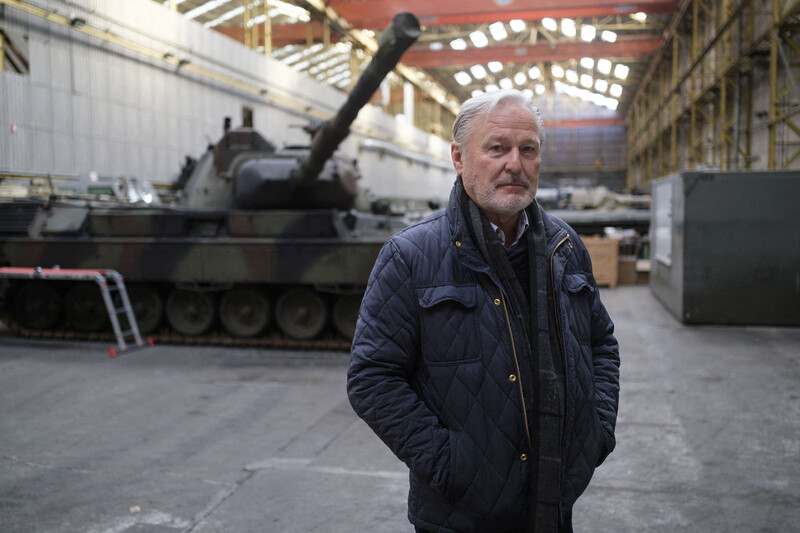Rights and Accountability 5 September 2024

Freddy Versluys represents the Israeli weapons giant Elbit in Belgium. (Abaca Press)
Belgium has quietly downgraded a case concerning a factory owned by Israel’s largest weapons company.
Later this month a trial will get underway over an incident at the OIP plant in Oudenaarde, near the Flemish city of Ghent. OIP is a subsidiary of the Israeli arms giant Elbit Systems.
In August 2022, two military vehicles in OIP’s parking lot were reportedly destroyed when Molotov cocktails were thrown at them. The slogan “shut Elbit down” was found at the scene.
Soon afterwards, Belgium’s federal prosecutor stated that a man arrested over the incident faced charges of arson with terrorist intent.
While the man still appears on a watchlist compiled by Belgium’s Coordination Unit for Threat Analysis, the charges against him have been altered.
The man is no longer being accused of acting with terrorist intent. Instead, he now faces a charge of arson concerning the military vehicles and one of attempted arson against the OIP building.
The incident occurred at night, when the building was unoccupied and nobody was hurt during it.
Following his arrest, the man spent more than two months in detention.
As well as a court hearing on the incident scheduled for 25 September, a subsequent one is expected early next month.
The second hearing will address a claim by Belgium’s military, which owns the vehicles that were destroyed at the OIP site. The military is seeking compensation of more than $2 million.
Among the services provided by OIP are the upgrading of combat vehicles.
The efforts by the Belgian military to seek compensation raise serious questions on why it was availing of such services from an Israeli subsidiary.
OIP is part of an Israeli weapons company that has directly profited from crimes against the Palestinian people. Yet the connections between OIP and Elbit are something of a taboo in Belgium.
Petra De Sutter, the country’s deputy prime minister, hails from Oudenaarde, where OIP is headquartered. Although she has spoken out against the Gaza genocide, she has refrained from making any comment – at least in public – about how her hometown hosts an Israeli weapons factory.
Arms dealer plays victim
Freddy Versluys, the head of OIP, has been playing the victim in recent times.
When the Oudenaarde plant was spray painted by activists in December last year, Versluys accused them of vandalism.
Versluys has repeatedly insisted that a few decades have elapsed since the authorities in Belgium granted him permits for exporting to Israel. Official reports on weapons exports published by the government in Flanders – the Dutch-speaking part of Belgium – cast doubt on his assurances and their veracity.
The reports do not name the manufacturers of arms and their components shipped to Israel. Yet the description of those exports bear a strong resemblance to how OIP describes its products.
Nor should it be forgotten that Elbit has owned OIP for more than 20 years. By acquiring the firm, Elbit gained a foothold in Europe, where it later expanded operations.
Announcing its latest quarterly results, Elbit stated that it had increased support for Israel during the current war against Gaza. Elbit added that it was simultaneously continuing “activities in the international market, including through its local subsidiaries.”
OIP is one such subsidiary – even if Freddy Versluys tries to distance himself from Israel.
Belgium is divided along linguistic lines. One thing that nonetheless unites both its Dutch and French-speaking authorities is that both have accommodated Israel’s crimes against humanity.
Through meticulous research, anti-war activists revealed that over 70 tons of munitions destined for Israel passed through Liège airport in Wallonia (southern Belgium) since the genocidal bombardment of Gaza began last October. The revelations caused sufficient embarrassment that the Walloon government closed a loophole which allowed planes carrying weapons to make a stopover in Liège, provided that the weapons remained onboard.
Closing the loophole is not the end of the matter. As Liège serves as a hub for Israel’s Challenge Airlines, it would be naive to think that all of the airport’s activities have suddenly become benign.





